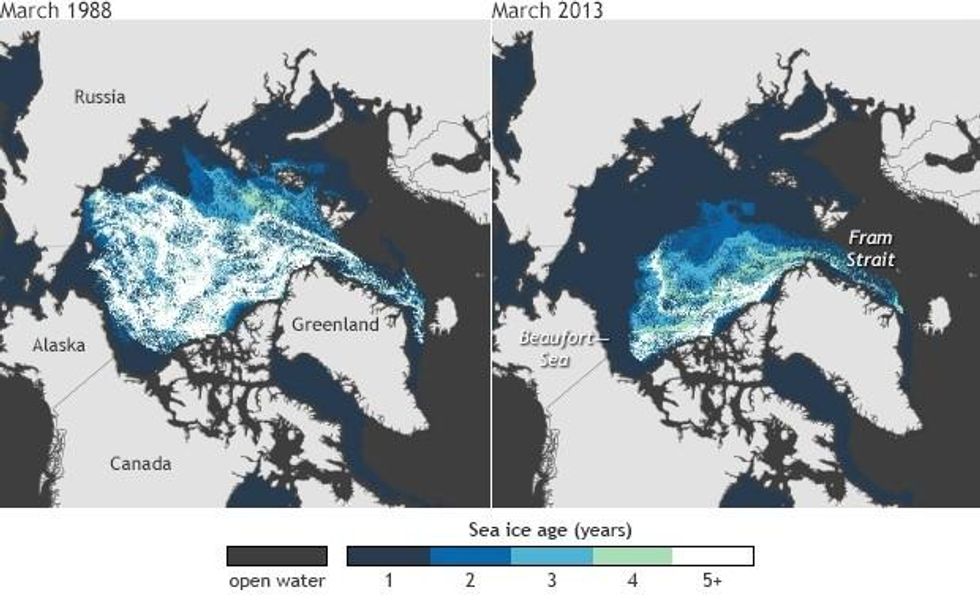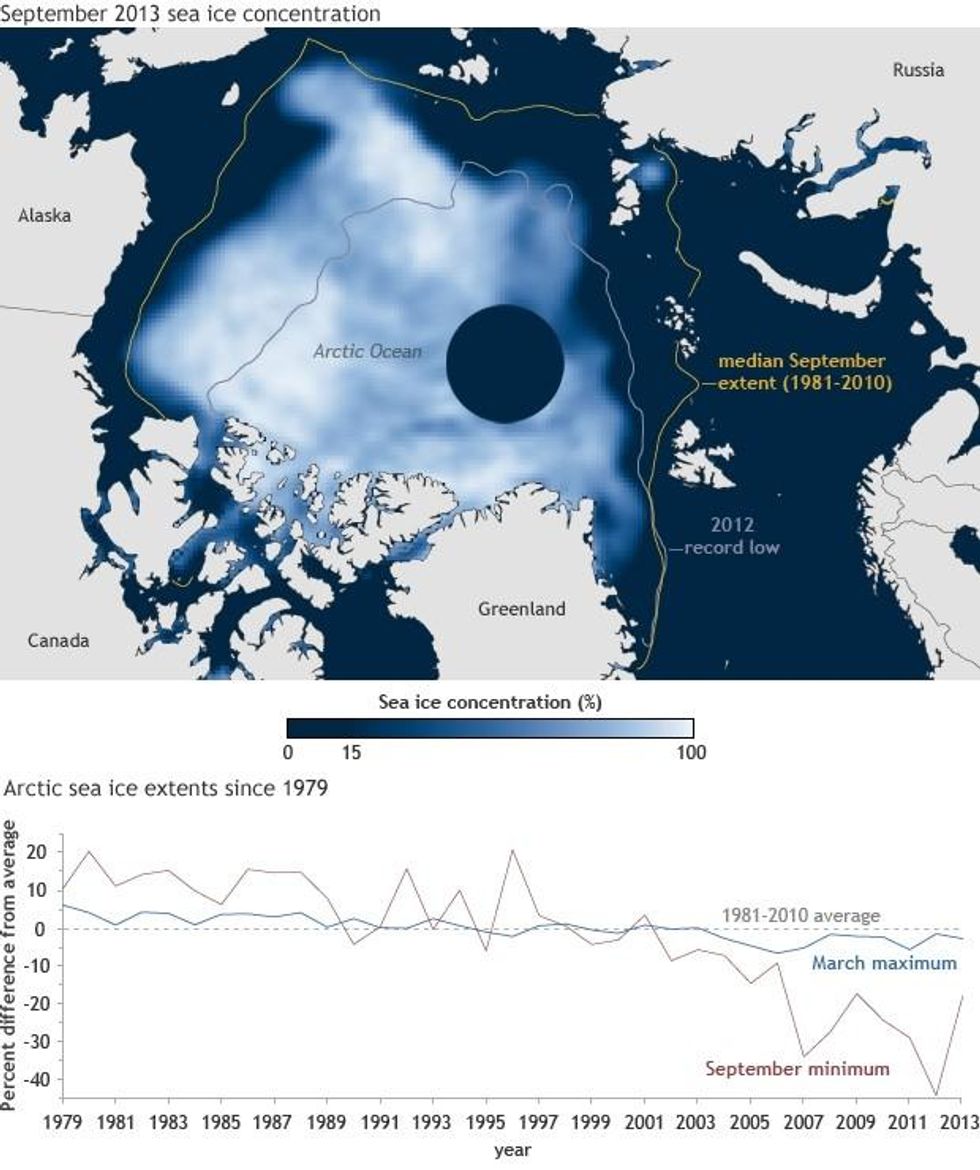

SUBSCRIBE TO OUR FREE NEWSLETTER
Daily news & progressive opinion—funded by the people, not the corporations—delivered straight to your inbox.
5
#000000
#FFFFFF
To donate by check, phone, or other method, see our More Ways to Give page.


Daily news & progressive opinion—funded by the people, not the corporations—delivered straight to your inbox.

Three decades of a consistent warming trend have made a greener Arctic the new normal, and "widespread, sustained changes" are set to come to region, the National Oceanic and Atmospheric Administration said in an assessment this week.
While its newest annual Arctic Report Card doesn't reveal the series of record-setting events seen in last year's analysis, the NOAA says the warming trend remains clear.
"The Arctic caught a bit of a break in 2013 from the recent string of record-breaking warmth and ice melt of the last decade," David M. Kennedy, NOAA's deputy under-secretary for operations, told press at the American Geophysical Union annual meeting in San Francisco. "But the relatively cool year in some parts of the Arctic does little to offset the long-term trend of the last 30 years: the Arctic is warming rapidly, becoming greener and experiencing a variety of changes, affecting people, the physical environment, and marine and land ecosystems."
The yearly assessment, based on contributions from over 147 authors, shows that the Arctic had its sixth warmest year on record; the Arctic sea ice extent was the sixth smallest on record, and the seven lowest recorded sea ice extents happened in the last seven years. Further, the thickness of the ice continues to decrease. The decreased ice coverage has brought warmer than average temperatures to Arctic boundary waters in the summer of 2013. The North American snow cover was the fourth lowest on record, while the snow cover in May over Eurasia hit a record low.

Some caribou and reindeer populations hit unusually low numbers, while climate change appears to be pushing some fish from warming waters into the Arctic.
"The Arctic Report Card presents strong evidence of widespread, sustained changes that are driving the Arctic environmental system into a new state and we can expect to see continued widespread and sustained change in the Arctic," said Martin Jeffries, principal editor of the 2013 Report Card, science adviser for the U.S. Arctic Research Commission, and research professor at the University of Alaska Fairbanks.
* * *
The NOAA provided this video to accompany the report card:
Arctic Report Card 2013Arctic Report Card: Update for 2013 - Tracking recent environmental changes, with 18 essays on different aspects of the ...
Dear Common Dreams reader, The U.S. is on a fast track to authoritarianism like nothing I've ever seen. Meanwhile, corporate news outlets are utterly capitulating to Trump, twisting their coverage to avoid drawing his ire while lining up to stuff cash in his pockets. That's why I believe that Common Dreams is doing the best and most consequential reporting that we've ever done. Our small but mighty team is a progressive reporting powerhouse, covering the news every day that the corporate media never will. Our mission has always been simple: To inform. To inspire. And to ignite change for the common good. Now here's the key piece that I want all our readers to understand: None of this would be possible without your financial support. That's not just some fundraising cliche. It's the absolute and literal truth. We don't accept corporate advertising and never will. We don't have a paywall because we don't think people should be blocked from critical news based on their ability to pay. Everything we do is funded by the donations of readers like you. Will you donate now to help power the nonprofit, independent reporting of Common Dreams? Thank you for being a vital member of our community. Together, we can keep independent journalism alive when it’s needed most. - Craig Brown, Co-founder |

Three decades of a consistent warming trend have made a greener Arctic the new normal, and "widespread, sustained changes" are set to come to region, the National Oceanic and Atmospheric Administration said in an assessment this week.
While its newest annual Arctic Report Card doesn't reveal the series of record-setting events seen in last year's analysis, the NOAA says the warming trend remains clear.
"The Arctic caught a bit of a break in 2013 from the recent string of record-breaking warmth and ice melt of the last decade," David M. Kennedy, NOAA's deputy under-secretary for operations, told press at the American Geophysical Union annual meeting in San Francisco. "But the relatively cool year in some parts of the Arctic does little to offset the long-term trend of the last 30 years: the Arctic is warming rapidly, becoming greener and experiencing a variety of changes, affecting people, the physical environment, and marine and land ecosystems."
The yearly assessment, based on contributions from over 147 authors, shows that the Arctic had its sixth warmest year on record; the Arctic sea ice extent was the sixth smallest on record, and the seven lowest recorded sea ice extents happened in the last seven years. Further, the thickness of the ice continues to decrease. The decreased ice coverage has brought warmer than average temperatures to Arctic boundary waters in the summer of 2013. The North American snow cover was the fourth lowest on record, while the snow cover in May over Eurasia hit a record low.

Some caribou and reindeer populations hit unusually low numbers, while climate change appears to be pushing some fish from warming waters into the Arctic.
"The Arctic Report Card presents strong evidence of widespread, sustained changes that are driving the Arctic environmental system into a new state and we can expect to see continued widespread and sustained change in the Arctic," said Martin Jeffries, principal editor of the 2013 Report Card, science adviser for the U.S. Arctic Research Commission, and research professor at the University of Alaska Fairbanks.
* * *
The NOAA provided this video to accompany the report card:
Arctic Report Card 2013Arctic Report Card: Update for 2013 - Tracking recent environmental changes, with 18 essays on different aspects of the ...

Three decades of a consistent warming trend have made a greener Arctic the new normal, and "widespread, sustained changes" are set to come to region, the National Oceanic and Atmospheric Administration said in an assessment this week.
While its newest annual Arctic Report Card doesn't reveal the series of record-setting events seen in last year's analysis, the NOAA says the warming trend remains clear.
"The Arctic caught a bit of a break in 2013 from the recent string of record-breaking warmth and ice melt of the last decade," David M. Kennedy, NOAA's deputy under-secretary for operations, told press at the American Geophysical Union annual meeting in San Francisco. "But the relatively cool year in some parts of the Arctic does little to offset the long-term trend of the last 30 years: the Arctic is warming rapidly, becoming greener and experiencing a variety of changes, affecting people, the physical environment, and marine and land ecosystems."
The yearly assessment, based on contributions from over 147 authors, shows that the Arctic had its sixth warmest year on record; the Arctic sea ice extent was the sixth smallest on record, and the seven lowest recorded sea ice extents happened in the last seven years. Further, the thickness of the ice continues to decrease. The decreased ice coverage has brought warmer than average temperatures to Arctic boundary waters in the summer of 2013. The North American snow cover was the fourth lowest on record, while the snow cover in May over Eurasia hit a record low.

Some caribou and reindeer populations hit unusually low numbers, while climate change appears to be pushing some fish from warming waters into the Arctic.
"The Arctic Report Card presents strong evidence of widespread, sustained changes that are driving the Arctic environmental system into a new state and we can expect to see continued widespread and sustained change in the Arctic," said Martin Jeffries, principal editor of the 2013 Report Card, science adviser for the U.S. Arctic Research Commission, and research professor at the University of Alaska Fairbanks.
* * *
The NOAA provided this video to accompany the report card:
Arctic Report Card 2013Arctic Report Card: Update for 2013 - Tracking recent environmental changes, with 18 essays on different aspects of the ...